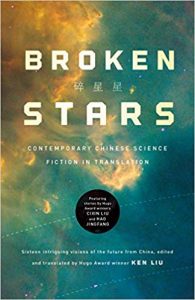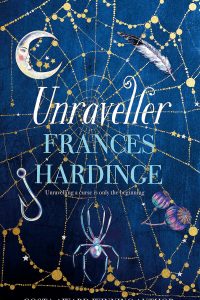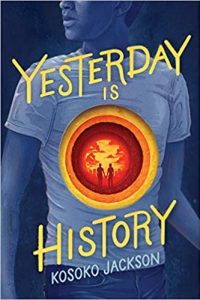Gary K. Wolfe Reviews Broken Stars, Edited by Ken Liu
 Broken Stars: Contemporary Chinese Science Fiction in Translation, Ken Liu, ed. (Tor 978-1250297662, $27.99, 480pp, hc) February 2019.
Broken Stars: Contemporary Chinese Science Fiction in Translation, Ken Liu, ed. (Tor 978-1250297662, $27.99, 480pp, hc) February 2019.
One aspect of Waste Tide that may come as a slight surprise to readers whose familiarity with Chinese SF is limited to Liu Cixin’s Remembrance of Earth’s Past trilogy, with its epic galactic scope and somewhat Clarkean ideas, is the degree to which the novel is grounded in gritty near-future realism, with nothing in sight resembling space opera or planetary adventures. Nor will we find much evidence of high space adventure in Ken Liu’s second anthology of Chinese SF, Broken Stars, which includes 16 stories mostly from the past decade (the oldest dates to 2004). The anthology represents a broader range of authors than his 2016 Invisible Planets – twice as many, as he points out in his introduction, though all the writers from that anthology also show up here. Seven of the stories appear here for the first time in English, and seven are by women. If, as Regina Kanyu Wang observes in one of three critical essays which accompany the stories, the development of Chinese SF was interrupted by the Cultural Revolution of the 1960s and again by Deng Xiaoping’s “spiritual pollution” campaign of the 1980s, it would seem that the genre represented here has a continuous history of something less than three decades. It took a lot longer than that for American SF anthologists to reach the kind of gender parity that Liu’s selections here represent.
As Liu insists in his introduction, he’s not out to provide a selection of “best” or “representative” stories, but rather he relies on his own tastes. That, of course, makes it hazardous to attempt foolish generalizations, but why should that stop me? What may not be true of Chinese SF in general might be somewhat true for Liu’s tastes, which are for the most part impeccable, and there do seem to be some interesting preoccupations in these tales. For example, the contributors here may not show much interest in outer space or other traditional SF tropes, but they seem fascinated with questions of time and consciousness. The longest and most haunting story in the book is Baoshu’s “What Has Passed Shall in Kinder Light Appear” (the rather florid title is from a Pushkin poem), a time-reversal tale that begins in the early 2000s (the narrator is four years old during the 2008 Chinese Olympics), but strange apocalyptic lights appeared in the sky when that narrator was born. That’s about all we get or need by way of explanation for what happens next: he grows up in a world recognizably our own, but with events reversed in time, from the SARS epidemic to 9/11 to the Cultural Revolution, all the way back, eventually, through Vietnam to the Mao Zedong era and eventually even WWII and Chiang Kai-shek. As with all such tales (such as Martin Amis’s Time’s Arrow), Baoshu has to paper over some of the details involved in turning effects into causes, but the real power of the story derives from the narrator’s lifelong, often-interrupted romance with his childhood girlfriend Qiqi, and from its brilliantly executed sense of diminishing expectations, such as when mobile phones are replaced by primitive landlines and laptops replaced by CRTs and eventually no computers at all. Something similar is at work in Gu Shi’s “Reflection”, only this time it’s a supposed clairvoyant who actually is experiencing time backwards, remembering the future but not knowing the past (though the story ends with a neat psychological twist).
Time also figures in two of the more traditionally ironic SF tales. In Liu Cixin’s “Moonlight”, the protagonist receives a series of phone calls from his future self, each persuading him to take actions to prevent global catastrophes, but with results that make the story an almost textbook example of SF’s familiar law of unintended consequences (with some echoes of Le Guin’s The Lathe of Heaven). Zhang Ran’s delightful “The Snow of Jinyang”, apparently part of a popular time-travel subgenre called chuanyue, features a rather exasperated time traveler introducing 10th century China to such things as movable type and a primitive mechanical internet – but also Ray-Bans, lightsabers, and Best Western motel signs. Chances are that some of the allusions to Chinese history will sail over the heads of Western readers like me, but then the same might be said of the allusions to sixth-century Rome in a novel like de Camp’s Lest Darkness Fall.
As “The Snow of Jinyang” suggests, one variation on the time theme is alternate history, and Han Song’s bizarre political satire “Salinger and the Koreans” (one of two stories included by this author) tells of the famous recluse’s retirement being interrupted by the North Korean army, which, inspired by his earlier work, managed to conquer the world, after an unspecified intervention by a mysterious Chinese figure called the Cosmic Observer. The idea of a novel like The Catcher in the Rye inadvertently redirecting world history may be an absurdist conceit, but it also calls attention to another recurring, if somewhat surprising theme in the anthology: the power and influence of writing itself. Anna Wu’s “The Restaurant at the End of the Universe: Laba Porridge” may borrow part of its title from Douglas Adams, but the story focuses on a novelist who, after failing to repeat his initial success, decides to steal particular skills from authors in parallel universes: plotting from a playwright, language from a poet, psychology from a thriller writer, insight from a scholar, imagination from an SF writer – a stew which reflects the bean-and-multigrain porridge of the story’s title, but with a key missing ingredient, which doesn’t really turn out to be much of a surprise. Similarly, Fei Dao’s “The Robot Who Liked to Tell Tall Tales” isn’t really a robot story (the title figure might as well be a magical automaton), but rather focuses on a young king whose compulsive lying earns him the title “Bullshit King,” and who hopes to draw attention away from this by instructing a robot to learn how to be an even more outrageous liar. After consulting various artists and poets, the robot comes to realize that it’s “necessary to disguise the truth in the form of ridiculous stories so that they may then seep into fragile and suspicious nerves.” The story’s ringing defense of bullshit is by extension a defense of imaginative writing in general – something that also seems to be on the minds of the essayists in the book’s concluding selections.
Some of the other stories reflect the blurring of genre and mainstream boundaries that has been increasingly common in much short fiction worldwide. Xia Jia’s “Goodnight, Melancholy” brilliantly juxtaposes the anxieties faced by a young woman in a near-future world of AIs and robots with barely fictionalized events from the tragic life of Alan Turing, while Tang Fei’s “Broken Stars” veers more toward the supernatural in telling of a troubled schoolgirl who tries to come to terms with her mother’s earlier death with the aid of a mysterious “pale lady.” Cheng Jingbo’s charming and vivid “Under a Dangling Sky”, set in the magical “Raintown,” draws on both fairy tales and the myth of Delphinus. The funniest story in the book, Ma Boyong’s “The First Emperor’s Games”, cheerfully offers no rationale at all for its absurdist premise: that the first emperor of a unified China, Qin Shi-huang, was a gaming addict whose Great Firewall of China “shielded the empire from all barbarian attacks as well as pop-up ads” and who derives military strategy from Candy Crush and Plants vs. Zombies. What’s more fascinating, once you get beyond the jokes, is how insightfully Ma Boyong manages to map actual historical strategies onto the gaming template.
The remaining stories include a powerful metaphor for economic oppression (Han Song’s “Submarines”, which turn out to be cheap homemade habitats for the poor), a Twilight Zone-ish mystery of a disappearing train (Hao Jingfang’s “The New Year Train”), and a short but pointed piece on love and death powered by the idea of a “brain box” that can record someone’s final thoughts, much like the black boxes of airliners. The two stories from Chen Qiufan are far removed from the gritty realism of Waste Tide: “Coming of the Light” begins as a kind of corporate satire involving a high web-marketing firm in Beijing and their problematic clients, but once they adapt a digital-watermarking program into something called “Buddhagrams,” things begin to go viral in a way no one could have anticipated (the collision of ancient belief and contemporary technology reflects the long SF tradition of stories like Clarke’s “The Nine Billion Names of God”). Chen’s other story, and the final story in the anthology, is a virtual mini-anthology itself. “A History of Future Illnesses” is a catalog of future ailments, mostly tech-mediated, which begins with something already upon us (“iPad Syndrome”) and includes disorders that involve a fashion for imitating disease symptoms, another for deliberately creating multiple personalities, yet another for delaying physical maturation into the 30s or 40s. One of the most interesting involves a procedure to alter the perception of time (a kind of biological version of the adjustable processing speeds in Greg Egan’s stories), though it ends up with disastrous results. It’s an excellent, flight-of-ideas way to conclude an anthology which, while it may not be “representative” of anything in particular, demonstrates that contemporary Chinese SF is as multilateral as any SF in terms of theme and form, and just as varied in style. To that last point, Liu’s translation skills, in a couple of instances in collaboration with Carmen Yiling Yan, manage to effectively convey a myriad of distinctive voices without ever ironing over the differences or compromising the readability of the whole. There are no doubt things that readers like myself will be missing in terms of cultural allusions and Chinese imaginative traditions (some of which are explained more fully in the helpful closing essays by Regina Kanyu Wang, Mingwei Song, and Fei Dao), but the seams barely show, and the result is a very stimulating selection that isn’t quite like any other SF anthology, and that, in the best ways, isn’t quite not, either.
Gary K. Wolfe is Emeritus Professor of Humanities at Roosevelt University and a reviewer for Locus magazine since 1991. His reviews have been collected in Soundings (BSFA Award 2006; Hugo nominee), Bearings (Hugo nominee 2011), and Sightings (2011), and his Evaporating Genres: Essays on Fantastic Literature (Wesleyan) received the Locus Award in 2012. Earlier books include The Known and the Unknown: The Iconography of Science Fiction (Eaton Award, 1981), Harlan Ellison: The Edge of Forever (with Ellen Weil, 2002), and David Lindsay (1982). For the Library of America, he edited American Science Fiction: Nine Classic Novels of the 1950s in 2012, with a similar set for the 1960s forthcoming. He has received the Pilgrim Award from the Science Fiction Research Association, the Distinguished Scholarship Award from the International Association for the Fantastic in the Arts, and a Special World Fantasy Award for criticism. His 24-lecture series How Great Science Fiction Works appeared from The Great Courses in 2016. He has received six Hugo nominations, two for his reviews collections and four for The Coode Street Podcast, which he has co-hosted with Jonathan Strahan for more than 300 episodes. He lives in Chicago.
This review and more like it in the April 2019 issue of Locus.
 While you are here, please take a moment to support Locus with a one-time or recurring donation. We rely on reader donations to keep the magazine and site going, and would like to keep the site paywall free, but WE NEED YOUR FINANCIAL SUPPORT to continue quality coverage of the science fiction and fantasy field.
While you are here, please take a moment to support Locus with a one-time or recurring donation. We rely on reader donations to keep the magazine and site going, and would like to keep the site paywall free, but WE NEED YOUR FINANCIAL SUPPORT to continue quality coverage of the science fiction and fantasy field.








